七下Unit 12 What did you do last weekend? 单元复习知识点课件(共30张PPT)
文档属性
| 名称 | 七下Unit 12 What did you do last weekend? 单元复习知识点课件(共30张PPT) | 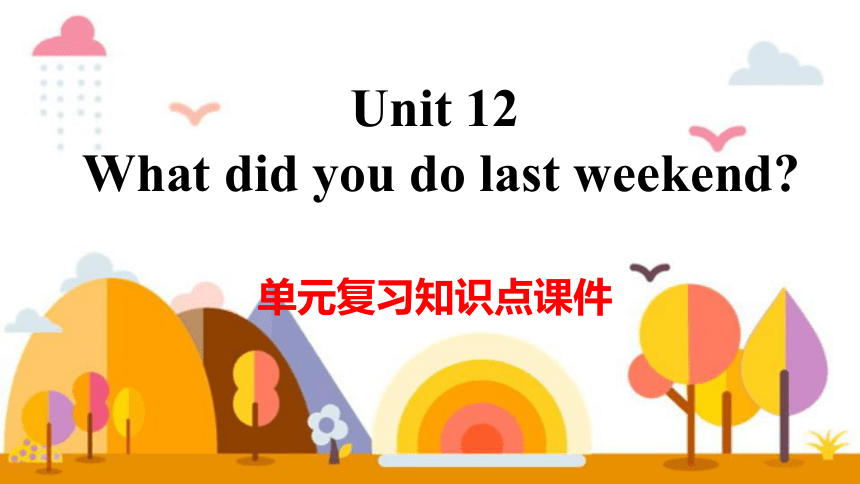 | |
| 格式 | pptx | ||
| 文件大小 | 171.9KB | ||
| 资源类型 | 教案 | ||
| 版本资源 | 人教新目标(Go for it)版 | ||
| 科目 | 英语 | ||
| 更新时间 | 2023-06-11 16:43:49 | ||
图片预览

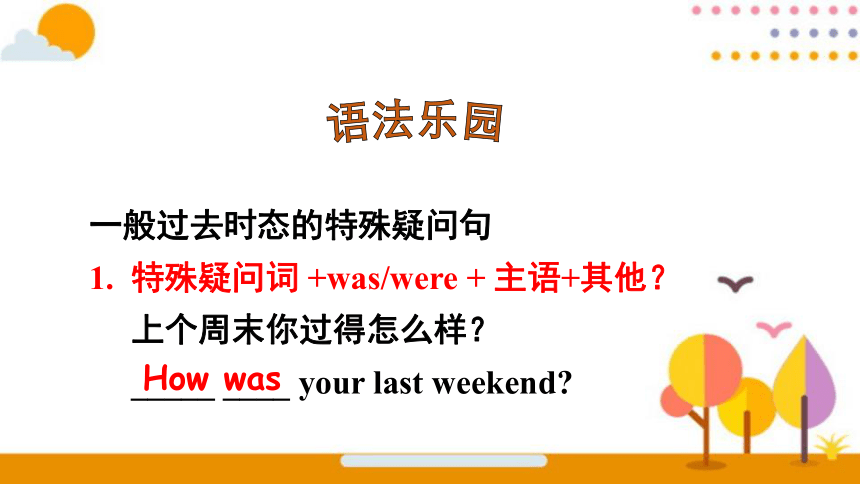
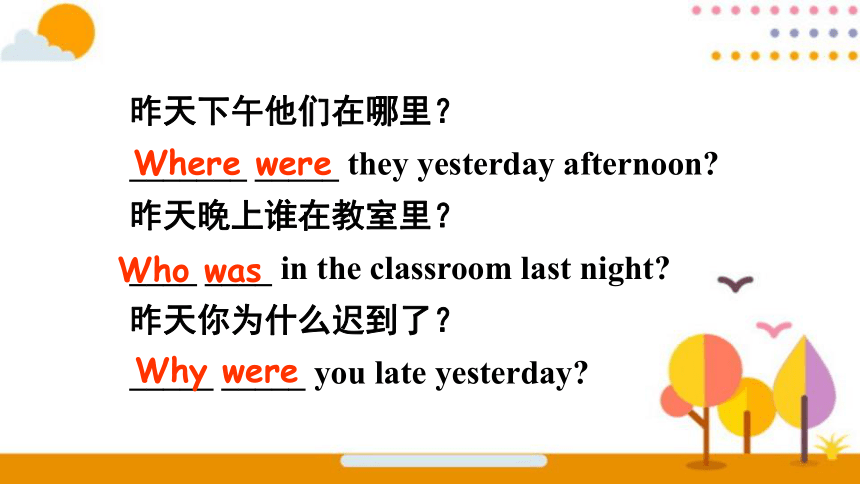
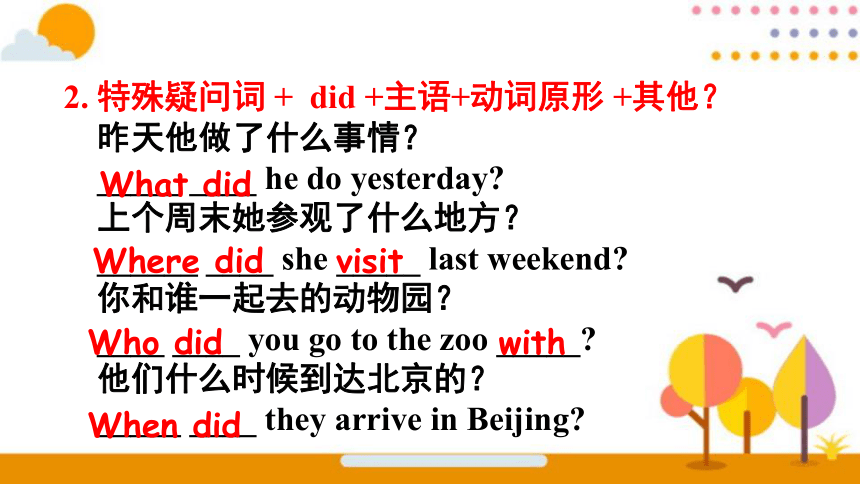
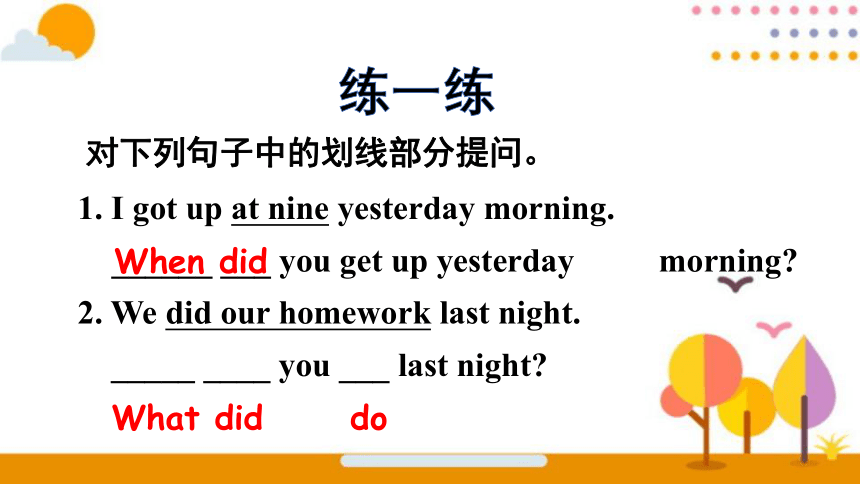
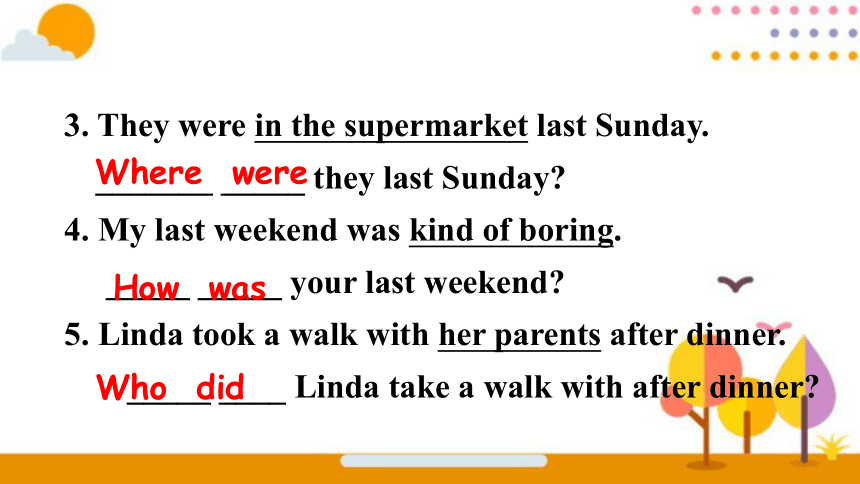

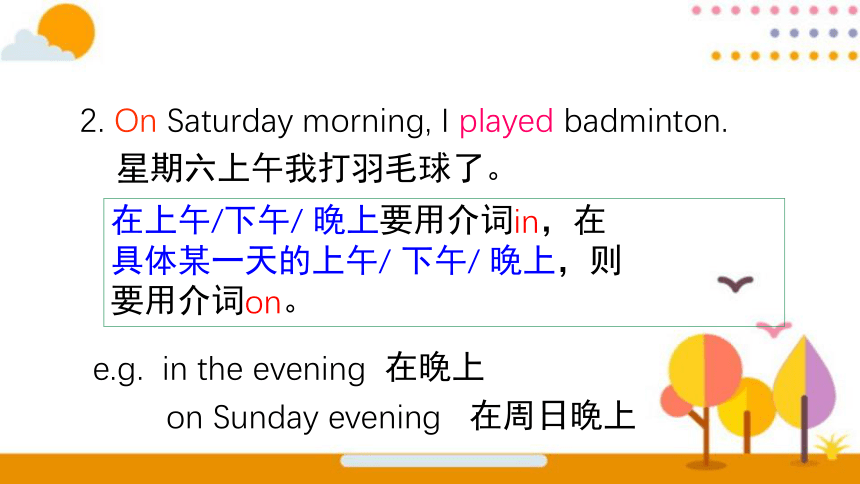
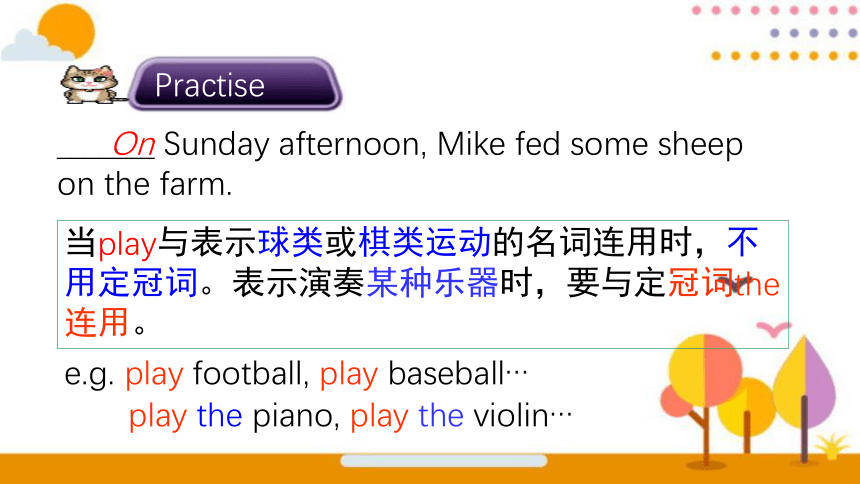
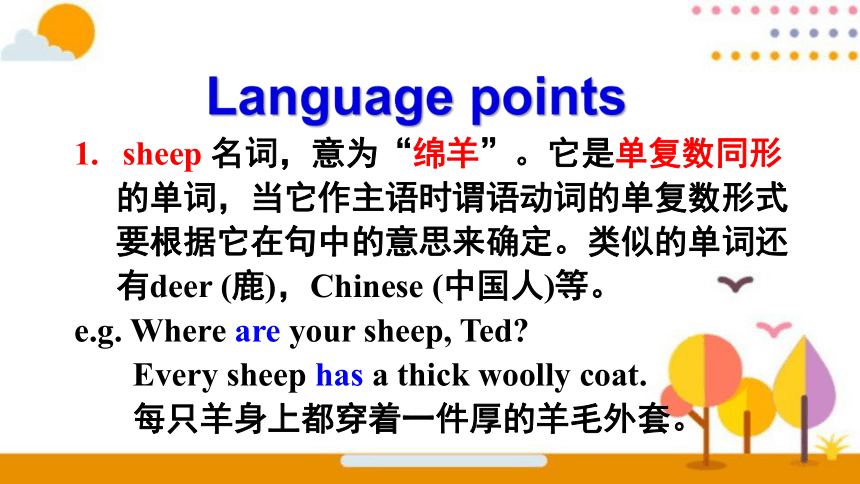
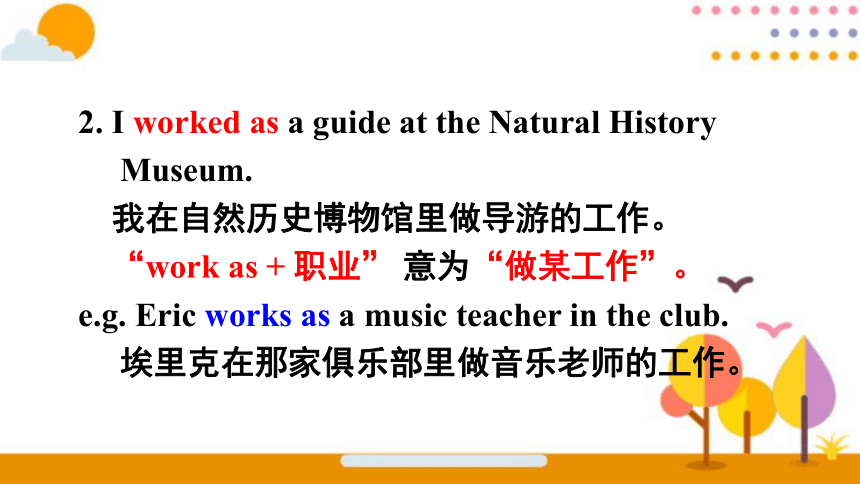
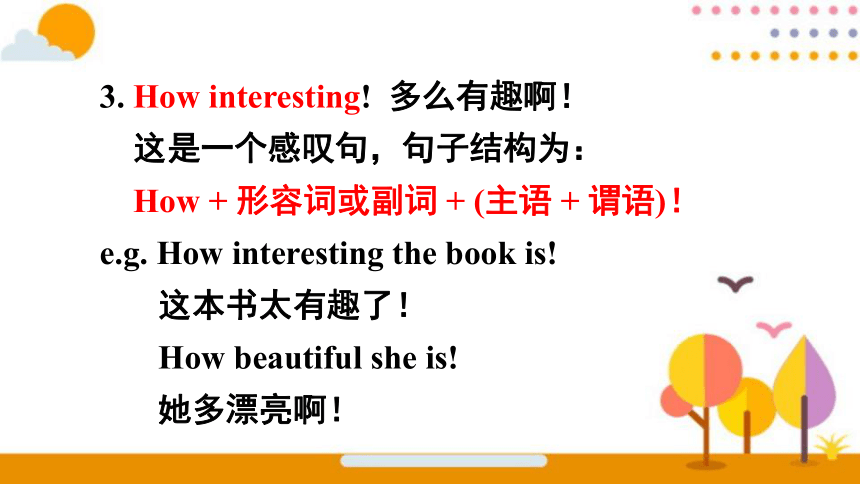
文档简介
(共30张PPT)
单元复习知识点课件
Unit 12
What did you do last weekend
一般过去时态的特殊疑问句
1. 特殊疑问词 +was/were + 主语+其他?
上个周末你过得怎么样?
_____ ____ your last weekend
How was
语法乐园
昨天下午他们在哪里?
_______ _____ they yesterday afternoon
昨天晚上谁在教室里?
____ ____ in the classroom last night
昨天你为什么迟到了?
_____ _____ you late yesterday
Where were
Who was
Why were
2. 特殊疑问词 + did +主语+动词原形 +其他?
昨天他做了什么事情?
_____ ____ he do yesterday
上个周末她参观了什么地方?
______ ____ she _____ last weekend
你和谁一起去的动物园?
____ ____ you go to the zoo _____
他们什么时候到达北京的?
_____ ____ they arrive in Beijing
Where did visit
When did
What did
Who did with
1. I got up at nine yesterday morning.
______ ___ you get up yesterday morning
2. We did our homework last night.
_____ ____ you ___ last night
What did do
When did
练一练
对下列句子中的划线部分提问。
3. They were in the supermarket last Sunday.
_______ _____ they last Sunday
My last weekend was kind of boring.
_____ _____ your last weekend
Linda took a walk with her parents after dinner.
_____ ____ Linda take a walk with after dinner
How was
Where were
Who did
“go + V-ing形式”常用来表示从事某种活动。如:
1. go boating 去划船
go shopping 去购物
go camping 去野营
go boating 去划船
go fishing 去钓鱼
Language points
2. On Saturday morning, I played badminton.
星期六上午我打羽毛球了。
在上午/下午/ 晚上要用介词in,在
具体某一天的上午/ 下午/ 晚上,则
要用介词on。
e.g. in the evening 在晚上
on Sunday evening 在周日晚上
Practise
_______ Sunday afternoon, Mike fed some sheep on the farm.
On
当play与表示球类或棋类运动的名词连用时,不用定冠词。表示演奏某种乐器时,要与定冠词the连用。
e.g. play football, play baseball…
play the piano, play the violin…
sheep 名词,意为“绵羊”。它是单复数同形
的单词,当它作主语时谓语动词的单复数形式
要根据它在句中的意思来确定。类似的单词还
有deer (鹿),Chinese (中国人)等。
e.g. Where are your sheep, Ted
Every sheep has a thick woolly coat.
每只羊身上都穿着一件厚的羊毛外套。
Language points
2. I worked as a guide at the Natural History Museum.
我在自然历史博物馆里做导游的工作。
“work as + 职业” 意为“做某工作”。
e.g. Eric works as a music teacher in the club. 埃里克在那家俱乐部里做音乐老师的工作。
3. How interesting! 多么有趣啊!
这是一个感叹句,句子结构为:
How + 形容词或副词 + (主语 + 谓语)!
e.g. How interesting the book is!
这本书太有趣了!
How beautiful she is!
她多漂亮啊!
4. stay up 意为“熬夜;深夜不眠”
e.g. Don’t stay up late. It’s bad for
your health. 不要熬夜,这对你
的健康不好。
Let’s stay up to see the New Year.
咱们别睡觉,迎接新年的到来吧。
Did you do anything interesting last weekend
上周末你做什么有趣的事情了吗?
形容词修饰something, anything,nothing等不定代词时,要放在这些不定代词的后面。如:
Language points
Come here! I have something important
to tell you.
过来!我有一些重要的事要告诉你。
改错。
Sally wants to do different something this time.
Practise
something different
two weeks ago 两星期前,一段时间 +ago
意为“多长时间之前”,是表达过去的时间。
它常与一般过去时态连用。
e.g. We visited the Natural History Museum
three days ago.
三天前,我们参观了自然历史博物馆。
Language points
【辨析】before 意为“在……之前”,其后
可以跟一个时间的点;表示“在某个时间点
之前”,但不一定用于一般过去时态。
e.g. I usually go to school before seven.
我常在七点钟前去上学。
此外,before也可以单独用,意为“以前”,
可用于一般过去时态中。
2. There we put up tents and made a fire
to keep us warm and cook food on.
在那里我们架起帐篷,生火取暖并做饭。
注意固定搭配的用法:
put up tents 搭帐篷
made a fire 生火
keep us warm 取暖
cook food on fire 在火上做饭
3. But I was so tired that I went to sleep early.
但是我太累了,所以就早早睡了。
I was so scared that I couldn’t move.
我太害怕了,以至于一动都不敢动。
“ so+形容词+that 句子”,表示“太……以至
于……”
e.g. The soup was so delicious that he drank
it up. 这汤太美味了,以至于他喝了个精光。
4. wake up“唤醒”;宾语可以是名词或代词;
名词可以放在wake up的后面或中间;
代词的话应放于 wake up 的中间。
e.g. 早上你常什么时候醒来?
When do you usually wake up
不要如此大声说话,你会将他们吵醒。
Don’t speak so loud. You’ll wake them up.
5.see/watch/feel/hear sb. doing sth.
看到/观察到/觉得/听到某人正在做某事
e.g. We can hear water running from
the mountain.
我们能听到水从山上流下来的声音。
Ⅰ.动词填空。
1. Last summer my family and I ______ (go)
to the beach.
2. When it _______ (rain), I stayed at home and
watched TV.
3. We ______ (be) in Dalian last year.
4. Tom _____ (be) always late for class last term.
5. What day _____ (be) it yesterday
went
rained
were
was
was
Exercises
Ⅱ.单项选择。
1. Last week, seven kids ______ a movie.
A. saw B. watch C. looked D. watched
2. Rick ______ up at 6:30 this morning.
A. get B. gets C. got D. gots
3. The Blacks ______ in the park last Sunday.
A. is B. are C. was D. were
4. I ______ English yesterday evening.
A. study B. studied C. studyed
5. --Where were you yesterday
-- I stayed ______ home, reading books.
A. at B. in C. for
6. My mother would like to visit _____ on Saturday.
A. relatives B. friend C. they
7. Everyone in our class _____ their holidays.
A. enjoy B. enjoying C. enjoys
8. He ______ TV for an hour last night.
A. saw B. looked C. watched
9. Did he ______ to bed late last night
A. went B. go C. goes
10. ______ Sunday morning, I played soccer
on my computer.
A. In B. At C. On
Ⅲ.翻译下列句子。
1. 他昨天晚上为语文考试而学习。
He _________ for Chinese ____ ____ ______.
2. 她假期去看她叔叔了。
She _______ her uncle _____ her vacation.
3. 他没有钱也没有家人。他不想做任何事。
He _____ ____ money and ____ family.
He doesn’t want to do __________.
studied
test last night
visited
on
has no
no
anything
4. 你怎样度过周末?
_____ _____ you ______ the weekend
5. 他们昨天举行聚会了。
They ____ ___ _______ yesterday.
6. 在星期日早上, 我打网球了。
____ _______ morning, I _______ tennis.
7. 上周,吉姆去看电影了。
Jim _____ to the movies last week .
How did
spend
had a party
On Sunday
played
went
Ⅳ.句型转换。
1. He did his homework yesterday. (否定句)
He ______ ____ his homework yesterday.
2. His mother often goes to buy something
after work. (同义句)
His mother often ____ _________after work.
3. She cleaned her room yesterday. (一般疑问句)
_____ she ______ her room yesterday
didn’t do
goes shopping
Did
clean
4. My weekend was very good. (划线部分提问)
_____ ______ your weekend
5. He often plays football after school.
(改写成一般过去时)
He often _______ football after school last year.
6. Did he study English well (肯定回答)
______, he ________ English well.
How was
played
studied
Yes
7. John’s weekend was great. (划线部分提问)
_____ _____ John’s weekend
8. My brother visited his teacher yesterday.
(特殊疑问句)
_____ _____ your brother ____ yesterday
9. It was time for lunch. (同义句)
It was time ____ _____ lunch.
How was
What did
do
to have
单元复习知识点课件
Unit 12
What did you do last weekend
一般过去时态的特殊疑问句
1. 特殊疑问词 +was/were + 主语+其他?
上个周末你过得怎么样?
_____ ____ your last weekend
How was
语法乐园
昨天下午他们在哪里?
_______ _____ they yesterday afternoon
昨天晚上谁在教室里?
____ ____ in the classroom last night
昨天你为什么迟到了?
_____ _____ you late yesterday
Where were
Who was
Why were
2. 特殊疑问词 + did +主语+动词原形 +其他?
昨天他做了什么事情?
_____ ____ he do yesterday
上个周末她参观了什么地方?
______ ____ she _____ last weekend
你和谁一起去的动物园?
____ ____ you go to the zoo _____
他们什么时候到达北京的?
_____ ____ they arrive in Beijing
Where did visit
When did
What did
Who did with
1. I got up at nine yesterday morning.
______ ___ you get up yesterday morning
2. We did our homework last night.
_____ ____ you ___ last night
What did do
When did
练一练
对下列句子中的划线部分提问。
3. They were in the supermarket last Sunday.
_______ _____ they last Sunday
My last weekend was kind of boring.
_____ _____ your last weekend
Linda took a walk with her parents after dinner.
_____ ____ Linda take a walk with after dinner
How was
Where were
Who did
“go + V-ing形式”常用来表示从事某种活动。如:
1. go boating 去划船
go shopping 去购物
go camping 去野营
go boating 去划船
go fishing 去钓鱼
Language points
2. On Saturday morning, I played badminton.
星期六上午我打羽毛球了。
在上午/下午/ 晚上要用介词in,在
具体某一天的上午/ 下午/ 晚上,则
要用介词on。
e.g. in the evening 在晚上
on Sunday evening 在周日晚上
Practise
_______ Sunday afternoon, Mike fed some sheep on the farm.
On
当play与表示球类或棋类运动的名词连用时,不用定冠词。表示演奏某种乐器时,要与定冠词the连用。
e.g. play football, play baseball…
play the piano, play the violin…
sheep 名词,意为“绵羊”。它是单复数同形
的单词,当它作主语时谓语动词的单复数形式
要根据它在句中的意思来确定。类似的单词还
有deer (鹿),Chinese (中国人)等。
e.g. Where are your sheep, Ted
Every sheep has a thick woolly coat.
每只羊身上都穿着一件厚的羊毛外套。
Language points
2. I worked as a guide at the Natural History Museum.
我在自然历史博物馆里做导游的工作。
“work as + 职业” 意为“做某工作”。
e.g. Eric works as a music teacher in the club. 埃里克在那家俱乐部里做音乐老师的工作。
3. How interesting! 多么有趣啊!
这是一个感叹句,句子结构为:
How + 形容词或副词 + (主语 + 谓语)!
e.g. How interesting the book is!
这本书太有趣了!
How beautiful she is!
她多漂亮啊!
4. stay up 意为“熬夜;深夜不眠”
e.g. Don’t stay up late. It’s bad for
your health. 不要熬夜,这对你
的健康不好。
Let’s stay up to see the New Year.
咱们别睡觉,迎接新年的到来吧。
Did you do anything interesting last weekend
上周末你做什么有趣的事情了吗?
形容词修饰something, anything,nothing等不定代词时,要放在这些不定代词的后面。如:
Language points
Come here! I have something important
to tell you.
过来!我有一些重要的事要告诉你。
改错。
Sally wants to do different something this time.
Practise
something different
two weeks ago 两星期前,一段时间 +ago
意为“多长时间之前”,是表达过去的时间。
它常与一般过去时态连用。
e.g. We visited the Natural History Museum
three days ago.
三天前,我们参观了自然历史博物馆。
Language points
【辨析】before 意为“在……之前”,其后
可以跟一个时间的点;表示“在某个时间点
之前”,但不一定用于一般过去时态。
e.g. I usually go to school before seven.
我常在七点钟前去上学。
此外,before也可以单独用,意为“以前”,
可用于一般过去时态中。
2. There we put up tents and made a fire
to keep us warm and cook food on.
在那里我们架起帐篷,生火取暖并做饭。
注意固定搭配的用法:
put up tents 搭帐篷
made a fire 生火
keep us warm 取暖
cook food on fire 在火上做饭
3. But I was so tired that I went to sleep early.
但是我太累了,所以就早早睡了。
I was so scared that I couldn’t move.
我太害怕了,以至于一动都不敢动。
“ so+形容词+that 句子”,表示“太……以至
于……”
e.g. The soup was so delicious that he drank
it up. 这汤太美味了,以至于他喝了个精光。
4. wake up“唤醒”;宾语可以是名词或代词;
名词可以放在wake up的后面或中间;
代词的话应放于 wake up 的中间。
e.g. 早上你常什么时候醒来?
When do you usually wake up
不要如此大声说话,你会将他们吵醒。
Don’t speak so loud. You’ll wake them up.
5.see/watch/feel/hear sb. doing sth.
看到/观察到/觉得/听到某人正在做某事
e.g. We can hear water running from
the mountain.
我们能听到水从山上流下来的声音。
Ⅰ.动词填空。
1. Last summer my family and I ______ (go)
to the beach.
2. When it _______ (rain), I stayed at home and
watched TV.
3. We ______ (be) in Dalian last year.
4. Tom _____ (be) always late for class last term.
5. What day _____ (be) it yesterday
went
rained
were
was
was
Exercises
Ⅱ.单项选择。
1. Last week, seven kids ______ a movie.
A. saw B. watch C. looked D. watched
2. Rick ______ up at 6:30 this morning.
A. get B. gets C. got D. gots
3. The Blacks ______ in the park last Sunday.
A. is B. are C. was D. were
4. I ______ English yesterday evening.
A. study B. studied C. studyed
5. --Where were you yesterday
-- I stayed ______ home, reading books.
A. at B. in C. for
6. My mother would like to visit _____ on Saturday.
A. relatives B. friend C. they
7. Everyone in our class _____ their holidays.
A. enjoy B. enjoying C. enjoys
8. He ______ TV for an hour last night.
A. saw B. looked C. watched
9. Did he ______ to bed late last night
A. went B. go C. goes
10. ______ Sunday morning, I played soccer
on my computer.
A. In B. At C. On
Ⅲ.翻译下列句子。
1. 他昨天晚上为语文考试而学习。
He _________ for Chinese ____ ____ ______.
2. 她假期去看她叔叔了。
She _______ her uncle _____ her vacation.
3. 他没有钱也没有家人。他不想做任何事。
He _____ ____ money and ____ family.
He doesn’t want to do __________.
studied
test last night
visited
on
has no
no
anything
4. 你怎样度过周末?
_____ _____ you ______ the weekend
5. 他们昨天举行聚会了。
They ____ ___ _______ yesterday.
6. 在星期日早上, 我打网球了。
____ _______ morning, I _______ tennis.
7. 上周,吉姆去看电影了。
Jim _____ to the movies last week .
How did
spend
had a party
On Sunday
played
went
Ⅳ.句型转换。
1. He did his homework yesterday. (否定句)
He ______ ____ his homework yesterday.
2. His mother often goes to buy something
after work. (同义句)
His mother often ____ _________after work.
3. She cleaned her room yesterday. (一般疑问句)
_____ she ______ her room yesterday
didn’t do
goes shopping
Did
clean
4. My weekend was very good. (划线部分提问)
_____ ______ your weekend
5. He often plays football after school.
(改写成一般过去时)
He often _______ football after school last year.
6. Did he study English well (肯定回答)
______, he ________ English well.
How was
played
studied
Yes
7. John’s weekend was great. (划线部分提问)
_____ _____ John’s weekend
8. My brother visited his teacher yesterday.
(特殊疑问句)
_____ _____ your brother ____ yesterday
9. It was time for lunch. (同义句)
It was time ____ _____ lunch.
How was
What did
do
to have
同课章节目录
- Unit 1 Can you play the guitar?
- Section A
- Section B
- Unit 2 What time do you go to school?
- Section A
- Section B
- Unit 3 How do you get to school?
- Section A
- Section B
- Unit 4 Don't eat in class.
- Section A
- Section B
- Unit 5 Why do you like pandas?
- Section A
- Section B
- Unit 6 I'm watching TV.
- Section A
- Section B
- Review of Units 1-6
- Unit 7 It's raining!
- Section A
- Section B
- Unit 8 Is there a post office near here?
- Section A
- Section B
- Unit 9 What does he look like?
- Section A
- Section B
- Unit 10 I'd like some noodles.
- Section A
- Section B
- Unit 11 How was your school trip?
- Section A
- Section B
- Unit 12 What did you do last weekend?
- Section A
- Section B
